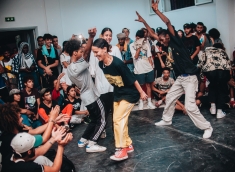Aiming to support attendees understand structural and systemic oppression, the specific needs of young people of colour, the barriers they face when attempting to access support services, and why there is a need for YIACS to implement more racially aware and responsive practices & services.
After two successful cohorts of Youth Access’ Community of Practice on developing more racially responsive services, we have supported staff from 18 member organisations across England. Reflecting on the program, this is what Program Facilitator Ez had to say.
I had the pleasure of being commissioned by Youth Access to deliver two courses addressing the need to develop racially responsive mental health services for young people. Working alongside experts in the youth mental health field, we designed and delivered a series of sessions supporting YIACS staff to look at the function of race and racism within their work. This work has felt transformational for a number of reasons.
Having worked in the youth sector for over 15 years I have witnessed firsthand the way racism prevents young people from accessing services. Young people, growing up in austerity Britain are under immense pressure which has adverse effects on wellbeing and mental health; this has only been exacerbated by the global pandemic.
We know that mental health concerns disproportionately affect minoritised young people and there are a plethora of reasons for this. Despite this need being apparent, minoritised youth experiencing difficulties with their mental health often encounter multiple challenges when seeking to engage with services that are supposed to be there to support them. We have a responsibility to change this and ensure that we are delivering services which centre the varied needs of all young people and these sessions are a forum to explore ways to enable this to happen.
Increased awareness on the prevalence of mental health challenges faced by young people in Britain has helped to amplify the need for services that are accessible and tailored to serve all young people. Recent years have seen a shift in the right direction in our thinking about race and youth services; however, we still have a long way to go. The sessions offered by Youth Access encourage people to look at their personal relationship to race and how this may affect their work, as well as the systemic and structural ways race and racism impacts our organisations and the sector as a whole.
Through a series of interactive exercises, discussions and teaching, we pose important questions that will help to shape our thinking when developing mental health services for young people. What is your relationship with race and how does this impact your work with young people? What biases do you hold and what does this mean for our organisational cultures? How do we look beyond equality, diversity and inclusion and create services where Black and minoritised youth are no longer an afterthought? We begin to tackle these questions as well as offer practical tools to dismantle historically racist practices embedded in the sector.
The process of designing and delivering these sessions has felt particularly special for me as a Black woman who also happens to live with borderline personality disorder (BPD) and ADHD as well as having a history of depression and anxiety. I have welcomed the opportunity to combine my professional, lived and living experiences to shine a light on the needs of young people accessing mental health services. Moreover, collaborating with a number of experts in the field who have a wide range of specialisms, has meant that the courses have covered a variety topics which speak directly to the gaps in services across the country.
The sessions address topics such as outreach and meaningful engagement, youth violence and criminal exploitation, developing a racially responsive workforce and valuing lived experience. Facilitators are able to give examples of best practice as well as offer support and guidance to participants seeking to apply knowledge gained to their context of work. Developing racially responsive services is no easy fete, and there is no one size fits all solution to the problems we are seeking to change. Through the courses on offer we seek to encourage people to think creatively about practical steps to invite change into their organisations.
We are realistic with our aims and objectives in this work and do not claim to have all of the answers. By no means are we suggesting that delivering this course will singlehandedly solve the issue of racism in the youth mental health sector. Acknowledging our limitations and encouraging participants to do the same is an important part of the process; however, providing an opportunity for people at all levels within the sector to earnestly address their personal bias as well as gain a deepened understanding of the systemic racial disparities faced by minoritised youth has meant that we have been able to nurture an open and informative learning environment.
Coming together, being open to challenge and embracing the need for curiosity has meant that the course is an open and informative space, supportive of tangible change. Each participant has shown up for themselves and the young people they are there to serve and despite the inevitable challenges that come with exploring race and identity, it has been a genuine pleasure to work with participants and the Youth Access team.
If you are curious about the relationship between race and youth mental health or looking to gain knowledge on how to develop a racially responsive service then please join the waiting list and keep up to date with upcoming courses.
